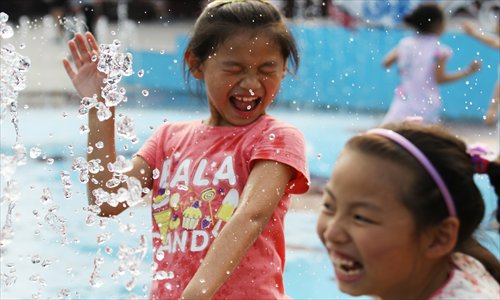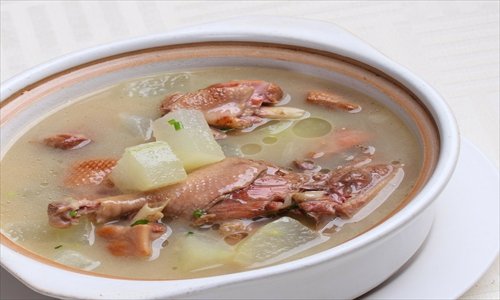Keeping "cold" at bay
Amid the bright and scorching sunlight, dashu or "great heat," the last official solar term in summer arrived last Sunday, July 22. This date usually marks one of the hottest days of the year. And in China, there is a special term to mark the hottest period of every year: sanfu, which consists of roughly 30 days and, in this year, will last from July 18 to August 16.
The weathermen have forecast that the hot weather is set to carry on all through this week, with the mercury remaining above 27 C, even at night.
The Global Times has looked into some of the health problems to be on the look out for during this period and offers some practical advice about how to maintain a healthy body and an energetic spirit.

Emotional heatstroke
When the thermometer reaches 35 C, daylight lasts more than 12 hours, and the humidity goes beyond 80 percent, people are likely to suffer from "emotional heatstroke," a condition accepted in Chinese medical circles which also goes by the name of "summer affective disorder syndrome." The symptoms include a changeable mood, susceptibility to depression, a poor memory and sleep problems. People who are under a lot of pressure at work, and who have sensitive natures, are often victims of this emotional heatstroke. So, how to avoid it?
Doctors recommend sufferers pay attention to their diet and get plenty of rest. They should also avoid strong tea, alcohol and coffee, which are all natural irritants; instead they should have some mung bean soup or herbal tea. It's a good idea to set aside strict rest periods during the day, with a half hour nap at noon being highly recommended.

Something in the air
Air conditioners may be a wonderful invention for coping with the stifling heat, but people should also be aware that over reliance and extended use can result in colds, fatigue, sore limbs, or even facial paralysis. These symptoms are known collectively in Chinese as kongtiao bing or "air conditioner disease."
The relatively dry air in an air-conditioned room is the prime suspect in cases of the disease. On one hand, we lose water from our bodies more quickly because our skin is being exposed to a dry environment; and on the other hand, we are breathing in dry air while exhaling wet air, which also leads to water loss. When our body lacks sufficient water it can lead to fatigue, dizziness, and the weakening of the immune system which makes people more prone to viruses.
The cold air blown out from air conditioners also stimulates the contraction of the blood vessels in the neck, limbs and back. And such problems with blood circulation can lead to muscular soreness. The victims of "air conditioner disease" are usually children, the elderly and women, but today even healthy white-collar males are becoming susceptible to it.
To avoid the disease, set the air-conditioner at a sufficiently high temperature, that is 25 C and above. People who accustom themselves to very low temperatures indoors may feel uncomfortable when confronted with the heat outside, which can also increase the risk of heatstroke.
Put a humidifier in air-conditioned rooms. A humidity level of 60 percent is recommended for air-conditioned environments.
Put on an extra layer of clothing when you are going to spend a relatively long time in an air-conditioned space where you have no control over the temperature, such as in a busy office or on public transport.
Remember to open the window for ventilation every day, and clean the air conditioner once a month in order to maintain the air quality in an air-conditioned environment.

Soup for summer
Besides bitter dishes, such as balsam pears, wild daisies, asparagus and lettuce, various kinds of soups are also popular among Chinese people for countering the summer heat.
White gourd, towel gourd, duck, Chinese pearl barley, cucumber, lily flowers and mung beans are among the most common ingredients for summer soups.
And the Global Times has found a DIY recipe for the popular white gourd and duck soup, which can help alleviate inner heat and stimulate the appetite.
Ingredients: 700 grams white gourd, 500 grams duck, several slices of ginger, 20 grams Chinese pearl barley, 5 grams salt, 2 liter water
Method:
Peel the white gourd, and cut into cubes, about two inches in length and width
Marinate the Chinese pearl barley for about an hour
Remove the organs of the duck, and cut the flesh into cubes
Stir-fry the meat with ginger and salt for 3 minutes on a high heat
Add water into the pot, and then add the white gourds and Chinese pearl barley when the soup boils, stew for 2 hours on a mild fire and serve